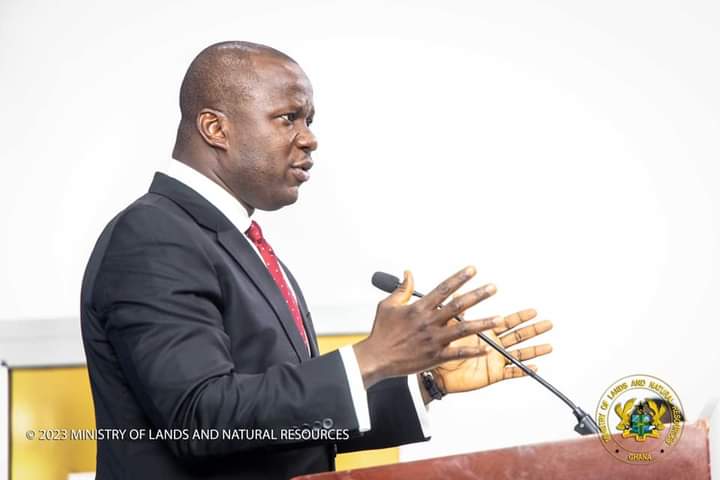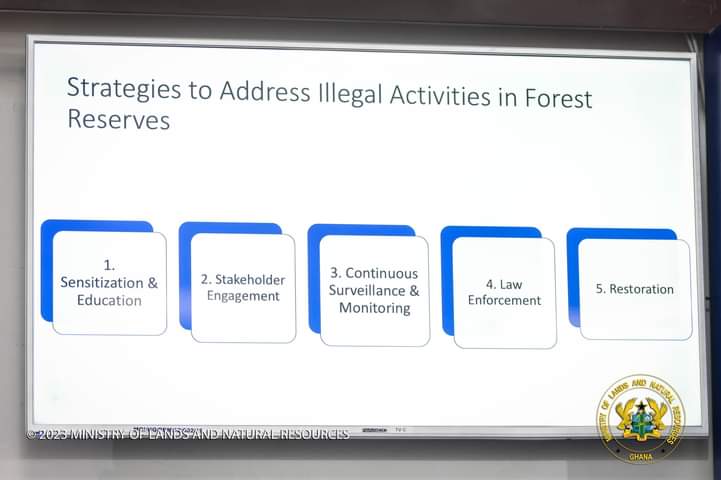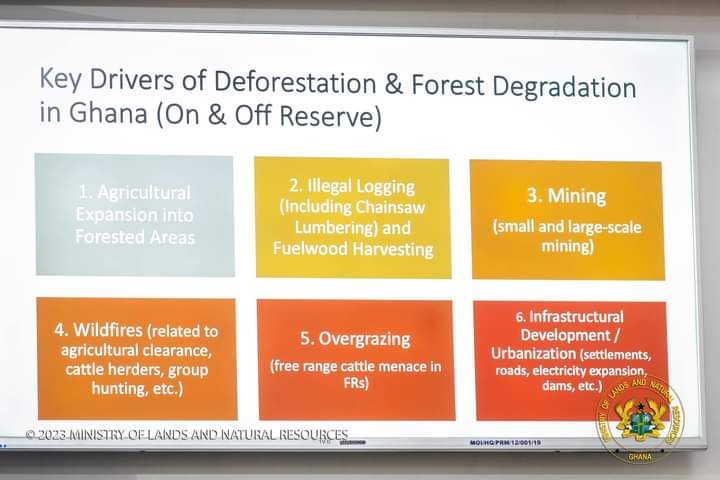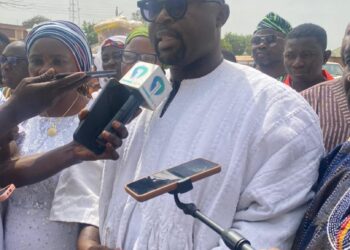The Minister of Lands and Natural Resources, Samuel Abu Jinapor has stressed that only a collective fight will ensure the results that all Ghanaians desire so far protecting the country’s forest is concerned.
He reiterated that the Ministry and the Forestry Commission have put in place adequate measures to protect the forest resources of the country, while working to increase the nation’s forest estate.
He said this during a press briefing held at the Ministry of Information to provide an update on the state of country’s forest reserves.

The Minister said Ghana has some estimated 6.6 million hectares of forest, made up of 1.2 million hectares of closed forest and 5.4 million hectares of open forest. He noted, however, that these had come under threat, largely from activities such as illegal mining and illegal logging.
Mr.a Jinapor stressed that the fight against deforestation and forest degradation is a process, and not an event. He said deforestation and forest degradation are not new phenomena, with the country having lost some 80 percent of our forest since 1900.
According to the Minister, the rate of deforestation peaked in 2014 saw over 35,000 of forest lost in that year alone.
He however gave the assurance that Government had put in place adequate measures to curb the menace. “What is important is the commitment to protect and preserve these resources, which we are fully determined to do,” the Minister said.
He cited initiatives such as the suspension of exploration in forest reserves, the ban on the harvesting of Rosewood and the issuance CITES permits as some of the measures being implemented to protect the existing forests.
The Minister also mentioned the Green Ghana Project, the Forest Plantation Strategy, the Youth in Afforestation Programme, the Youth in Plantation Establishment as an Occupation Programme and other programmes that seek to increase the forest estate of the country.
He revealed that Cabinet had directed the National Security Coordinating Committee, chaired by the Minister of National Security, Albert Kan Dapaah, to work with the Forestry Commission to flush out all persons involved in illegal operations in Forest Reserves.
The Minister further indicated that attempts by successive Governments to come to grips with this menace had seen mixed results.
“Indeed, in the 2012 Forest and Wildlife Policy, the then Minister of Lands and Natural Resources, Hon. Mike Hammah, in his foreword, rightly, bemoaned, and I quote: ‘The implementation of the 1994 [Forest and Wildlife] policy with all the associated reforms could not halt the degradation in the forest resource base. Illegal chainsaw and mining (galamsey) operations in forest areas have thrived over the years despite conscious national efforts to curb the situation in collaboration with the security agencies’.
Such references, he said, is not to apportion blame, and/or to pass the buck but to be able to marshal a critical mass of support for Government’s policy in this very crucial sector. He emphasised that “we have to set out all the facts, including the historical antecedent”.

“That is the best way to chart the future. I do not, therefore, seek to justify the continuous degradation of our forests, but to let you appreciate the enormity of the problem we are dealing with. It is a historical challenge. We require a concerted and determined effort to clamp down on deforestation and the degradation of our forests, and we will continue to do just that,” he reiterated.
For his part, the Chief Executive Officer of the Forestry Commission, John Allotey, said the key drivers of deforestation and forest degradation are agricultural expansion, illegal logging, illegal mining, wildfires, overgrazing and infrastructural development.
He pointed out that the Apamprama, Oda River and Subin Shelterbelt Forest Reserves as some of the most impacted Reserves by activities of illegal miners and loggers.
In addressing the situation, Mr Allotey said, the Forestry Commission had adopted several law enforcement measures. These, he said, include the training of 964 Field Officers, the procurement of 1000 pump action guns, the inauguration of Rapid Response Teams and the training of Forest Managers to prosecute forest offences.

He noted that through these measures, several equipment, including excavators and chainsaw machines, had been seized and demobilised in Forest Reserves. According to him, the Commission is also using technology to trace timber from the forest till final disposal, that, he stressed, will ensure that only wood legally sourced is allowed on the Market.
Touching on measures being adopted to increase the country’s forest estate, Mr Allotey disclosed that under the Ghana Forest Plantation Strategy alone, some 690,436 hectares of forest was cultivated between 2017 and 2022.
He added that the Commission has intensified its reclamation efforts, through the Forest Investment Programme and the Ghana Landscape Restoration and Small Scale Mining Project (GLRSSMP), to reclaimed degraded forests.
Mr Allotey further called on all stakeholders, including traditional authorities and civil society organisations, to support the Commission to protect the country’s forest reserves.
Source: Padfm.com.fm/townnewsonline

















